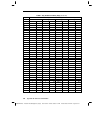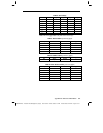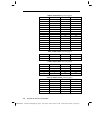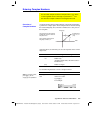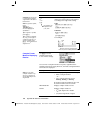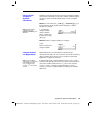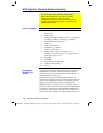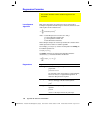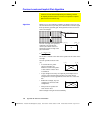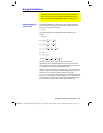
568 Appendix B: Reference Information
8992APPB DOC TI
-
89/TI
-
92 Plus:8992a
pp
b doc (English) SusanGullord Revised:02/23/01 1:54 PM Printed: 02/23/01 2:24 PM Page 568 of 34
Level Operator
1 Parentheses ( ), brackets [ ], braces { }
2 Indirection (#)
3 Function calls
4 Post operators: degrees-minutes-seconds (
ó
,',"), factorial (!),
percentage (%), radian (
ô
), subscript ([ ]), transpose (
î
)
5 Exponentiation, power operator (^)
6 Negation (
ë
)
7 String concatenation (&)
8 Multiplication (
ù
), division (/)
9 Addition (+), subtraction (
ì
)
10 Equality relations: equal (=), not equal (
ƒ
or /=),
less than (<), less than or equal (
or <=), greater than (>),
greater than or equal (
‚
or >=)
11 Logical
not
12 Logical
and
13 Logical
or
, exclusive logical
xor
14 Constraint “with” operator (|)
15 Store (
!
)
All calculations inside a pair of parentheses, brackets, or braces are
evaluated first. For example, in the expression
4(1+2)
, EOS first
evaluates the portion of the expression inside the parentheses,
1+2
,
and then multiplies the result,
3
, by
4
.
The number of opening and closing parentheses, brackets, and
braces must be the same within an expression or equation. If not, an
error message is displayed that indicates the missing element. For
example,
(1+2)/(3+4
will display the error message
“Missing ).”
Note:
Because the
TI
-
89 / TI
-
92 Plus
allows you to define your own
functions, a variable name followed by an expression in parentheses
is considered a “function call” instead of implied multiplication. For
example
a(b+c)
is the function
a
evaluated by
b+c
. To multiply the
expression
b+c
by the variable
a
, use explicit multiplication:
a
ù
(b+c)
.
EOS (Equation Operating System) Hierarchy
This section describes the Equation Operating System
(EOS
é
) that is used by the TI
-
89 / TI
-
92 Plus. Numbers,
variables, and functions are entered in a simple,
straightforward sequence. EOS evaluates expressions and
equations using parenthetical grouping and according to the
priorities described below.
Order of Evaluation
Parentheses,
Brackets, and
Braces



